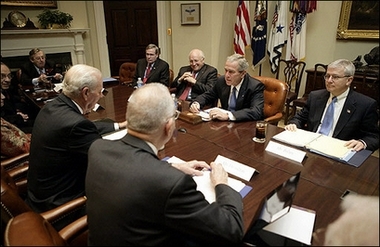Bush trades ideas on Iraq with panel
(AP)Updated: 2006-11-14 08:48
WASHINGTON - US President Bush traded ideas on Iraq with a bipartisan commission Monday and promised to work with the incoming Democratic majority toward "common objectives." At the same time, he renewed his opposition to any timetable for withdrawing US troops.
As Bush met with the Iraq Study Group, the Democrat in line to lead the Senate Armed Services Committee, Carl Levin of Michigan, said the administration didn't see that "we're getting deeper and deeper into a hole."
|
|
Bush in turn had stern words for the Democrats, less than a week after they won control of both chambers of Congress in midterm elections in which the Iraq war figured prominently.
Asked about proposals by Levin and others for a phased troop reduction, Bush said, "I believe it is very important ... for people making suggestions to recognize that the best military options depend upon the conditions on the ground."
While Democrats agree that troops should leave Iraq sooner rather than later, they remain divided on the specifics. Rep. John Murtha (news, bio, voting record), D-Pa., a contender to become the next majority leader, supports an immediate withdrawal of all troops, whereas Levin and others favor a slower phased withdrawal and have been reluctant to suggest a firm timetable.
Whereas Murtha and some others contend violence in Iraq will continue so long as U.S. troops are present, Levin and others warn that any withdrawal of troops must be done slowly to avoid a collapse in security.
Baker's panel has been briefed on the Democrats' proposals and is considering a range of options. In addition to considering whether there should be any timetable to pull out troops, the panel is studying many other options, including whether to solicit Iran and Syria to help stop the fighting.
The president met for more than an hour with a 10-member panel headed by former Secretary of State James A. Baker III and former Democratic Rep. Lee Hamilton. He was joined by Vice President Dick Cheney, Chief of Staff Josh Bolten and National Security Adviser Stephen Hadley.
The panel then stayed around for a longer session that included other members of the president's national security team, including Secretary of State Condoleezza Rice and outgoing Defense Secretary Donald H. Rumsfeld.
Baker and Hamilton later put out a joint statement. "We were pleased to meet with senior administration officials today and look forward to our consultations with some top Democrats tomorrow. We are working expeditiously to complete our report and recommendations," the statement said.
Bush discussed the meeting with reporters during a picture-taking session in the Oval Office with visiting Israeli Prime Minister Ehud Olmert.
| 1 | 2 |  |
|
||
|
||
|
|

